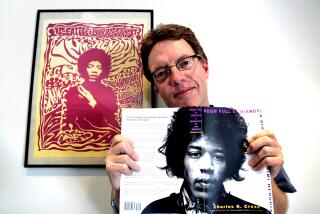Paul Nelson, 70; Critic Had Early Ties to Dylan
- Share via
Paul Nelson, a pioneering rock critic whose interest in folk music led to an early connection with fellow Minnesotan Bob Dylan, has died. He was 70.
Nelson was found dead July 4 at his New York City apartment. The cause of death was heart disease, according to the New York City medical examiner’s office.
An editor and reviewer for Rolling Stone, Circus and Creem music magazines in the 1960s and ‘70s, Nelson started the Little Sandy Review folk music journal while he and Dylan were students at the University of Minnesota in the early ‘60s.
Nelson was known for his eclectic taste in music, as reflected by his bold signing of early punk rockers the New York Dolls when he worked for Mercury Records in the 1970s.
Unlike other early influential rock critics such as Greil Marcus, Robert Christgau and Dave Marsh, Nelson had faded from the music scene in recent years, only to reappear last year in Martin Scorsese’s PBS television documentary on Dylan, “No Direction Home.” Nelson was interviewed extensively in the film about the singer’s roots in Minnesota and Dylan’s breakout performances after moving to New York City.
A native of Warren, Minn., Nelson attended St. Olaf College for a year before transferring to the University of Minnesota in Minneapolis. He and a friend hatched the idea of writing about the folk scene so they could get free review copies of records. The Little Sandy Review attracted the attention of Dylan, who was also exploring folk music.
“In a sense, Paul preceded all of us,” Christgau, the longtime Village Voice rock critic, told The Times. “Little Sandy Review was a serious literary magazine about folk music.”
Nelson soon moved to New York and took over as managing editor of another folk publication, Sing Out!, but readers and music fans were starting to take sides, with some favoring traditional acoustic arrangements and others seeking progressive electric versions.
Dylan made his famous switch to electric guitar at the 1965 Newport Folk Festival, and Nelson was one of the few folk music observers to publicly support him.
“When I heard ‘Like a Rolling Stone,’ it changed everything for me,” Nelson told music writer Steven Ward in a 2000 interview for the website RockCritics.com.
“I quit Sing Out! because I knew they were going to nail him to the wall for not writing protest songs, and I did not want any part of it.”
It was on to Circus and then Rolling Stone, where he wrote and edited stories about a variety of music styles. As record reviews editor at Rolling Stone, he championed the albums of singer-songwriters such as Jackson Browne as well as punk rockers the Sex Pistols and the Ramones. He also wrote longer pieces, including one in 1981 on Warren Zevon and his struggle with alcoholism.
Two of his essays were included in “The Rolling Stone Illustrated History of Rock & Roll” (1976), one on folk rock and another on Dylan -- the latter written in the style of detective fiction, reflecting the latitude extended to the magazine’s writers in the early days.
Nelson’s contribution, Marcus said in 2000, “was to insist on a moral dimension to pop music.... He was sensitive to the risks and the degree of courage or nerve it takes to make a public choice, and to thus stand alone and stand exposed.”
While he was writing for Rolling Stone, Nelson crossed over to take an active part in the music business at Mercury Records, working for a few years in publicity as well as artist development.
Nelson went back to writing freelance pieces for various music publications before leaving the music business. From the late 1980s until last summer, he worked at Evergreen Video in New York’s Greenwich Village.
“I don’t really want a job anymore where you have to think,” Nelson told Ward in 2000. “The store has a lot of old films and foreign films. A lot of movie nuts come in, and you get to talk about the movies. I couldn’t possibly go back to writing about rock. I don’t have any comparison points anymore.”
Survivors include a son, Mark Nelson of Dallas.
More to Read
The biggest entertainment stories
Get our big stories about Hollywood, film, television, music, arts, culture and more right in your inbox as soon as they publish.
You may occasionally receive promotional content from the Los Angeles Times.










